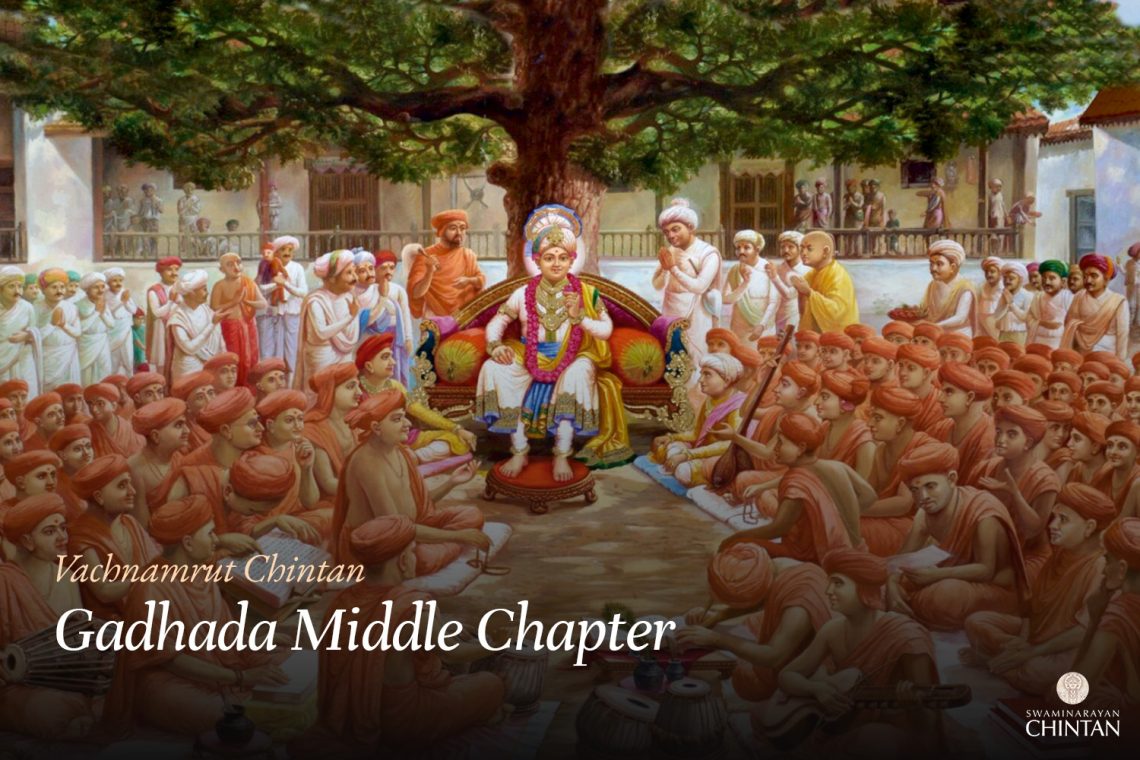Central Insights:
- Characteristics of Love
Key Points:
- True love for Bhagwan is when one has no love for anything else besides Bhagwan.
Explanation:
Shriji Maharaj was listening to kirtan-bhakti (devotional singing). After the kirtan-bhakti was over, Maharaj remarked, “After listening to this kirtan, my mind became immersed in thought. Then I realized that having deep love for Bhagwan is indeed a great matter.” After this, Gopalanand Swami and other devotees who had love for Bhagwan arrived, and they too spoke about their love for Bhagwan. Maharaj then said, “I also examined my own heart. However, the kind of love I have, I did not perceive in them.”
In this Vachanamrut, Maharaj illustrates what extraordinary love is like. He describes various characteristics of extraordinary love in different Vachanamruts. For example, in Vach. Kariyani 11, Maharaj states, “The sign of one who has love for their beloved Bhagwan is that they will never disregard the will of their beloved.” He then gives the example of the Gopis, who displayed extraordinary love.
Furthermore, in Vach.G.M.69, Maharaj describes the characteristics of one whose heart is deeply attached to Bhagwan, saying, “Even if one is exhausted from walking, suffering from a disease, insulted, or has lost their wealth and prosperity, upon hearing katha-varta (stories and discourses) of Bhagwan, they feel as if they are alone and disconnected from everything else.” Such a person has developed true attachment to Bhagwan’s form.
In addition, in Vach. Vadtal 4, Maharaj praises the exceptional devotion of King Pruthuraj by highlighting his devotion through hearing (listening to spiritual discourses). Similarly, in the Narad Bhakti Sutra, Naradji explains an extraordinary characteristic of love by saying, तदर्पिताखिलाचारता तद्विस्मरणे परमव्याकुलता — tadarpitākhilācāratā tadvismaraṇe paramavyākulatā; — meaning, “All his activities are for Bhagwan, and he experiences extreme distress in separation from Him.” This type of extreme distress from separation and unwavering commitment in the face of insult or adversity is a mark of extraordinary love. This aligns with Vach. Sarangpur 10, where Maharaj says, “Even if a saint faces five severe blows daily, they still do not wish to distance themselves from Bhagwan.”
Reading all these descriptions, we observe a unique aspect of love in this Vachanamrut that draws our attention. The question is: What is the depth of love or devotion rooted in? Is it in upholding purity in one’s own nature and resisting all other attachments, or is it in maintaining one’s own expansion of that purity? The authenticity of love lies in experiencing its fullness and relishing it in samyog (union) or in enduring the unbearable pain of viraha (separation). Love has two states: “a moment seems like an age” and “an age seems like a moment.” Which of these conditions reveals the truest expression of love? When considering the history of devotion, we find that negative attributes, such as separation, often reveal deeper insights into the nature of love than positive ones do.
Love should pervade one’s being 24 hours a day and make one constantly aware of its presence. But more than that, it should focus on how intolerable other attachments have become in the person who possesses such love. That is why Maharaj says in this Vachanamrut that the great santo and devotees came to meet Him. He examined their hearts and found that their love for Bhagwan was noticeable, but when He compared it to His own love, He found a difference. He noted that, although they were highly esteemed, when exposed to negative desh-kal (time and circumstances), their minds could waver. It became apparent that their foundation was weak. Maharaj realized that when negative desh-kal arise, it becomes uncertain whether their love for Bhagwan will remain. Thus, He affirmed that His own core was solid, and no matter what negative influences arose, His heart would never turn away. Hence, true love for Bhagwan is when one cannot love any object other than Bhagwan.
The nature of true love is such that it cannot tolerate the presence of any other love in the place where it resides, and it cannot settle until the roots of the other love are entirely uprooted. A young man may have deep love for his mother, but once he marries and his love for his wife grows, his mother’s words begin to seem bothersome, and if she offers good advice, it feels like nagging. True peace only comes when the influence of the other love is removed. This is the deep nature of true love.
The greatest proof of a devotee’s love for Bhagwan is when they automatically develop the strength to confront other loves. If one can still maintain love for other attachments while simultaneously loving Bhagwan, then their love for Bhagwan cannot be considered deep. Maharaj compares this to a A saffron coloured garment, which initially appears very attractive but fades
when it is exposed to water and then dried in the sun, losing all its color and becoming dull. Similarly, one who loves the panch-vishay (the five sense objects), when exposed to bad company, will lose their love for Bhagwan. Therefore, a true devotee of Bhagwan who wishes to develop deep love for Him must renounce the excessive attachment to the panch-vishay. One should not hold any object dear that hinders one’s love for Bhagwan.
Glossary
| Panch-vishay – The five sensory objects Sound, touch, sight, taste, and smell—material objects of attachment that hinder devotion. |
| Samyog – Union |
| Viraha – Extreme distress on Separation |
| Desh-kal – Place and time |
| Kirtan-bhakti – Devotional singing Singing with devotion and focus on Bhagwan, which strengthens love and attachment to Him. |
| Gopis – Devotees of Krishna |
| Negative desh-kal – Adverse circumstances Difficult situations that test the strength of one’s love for Bhagwan. |

